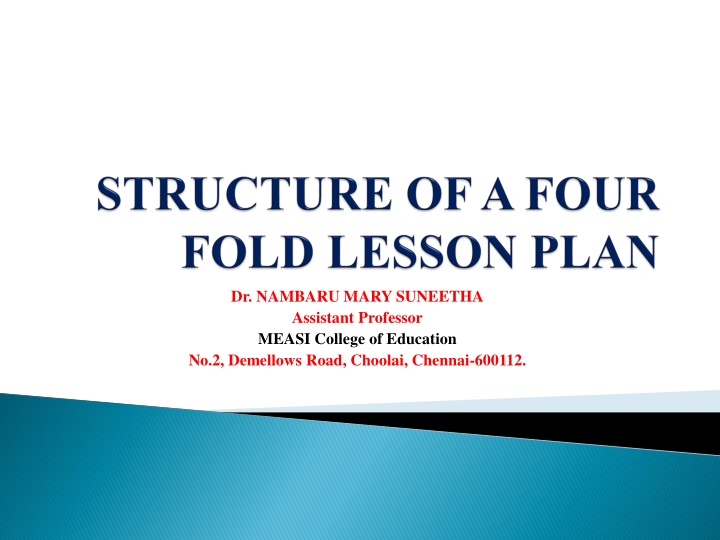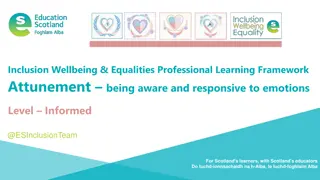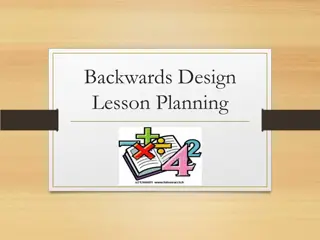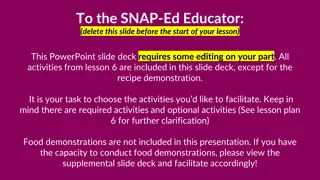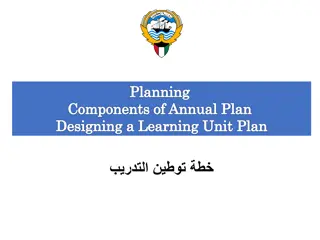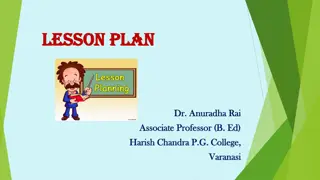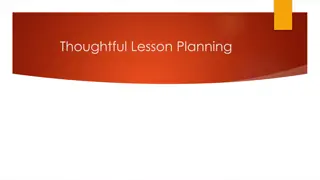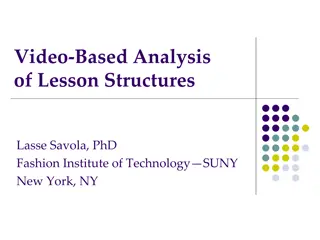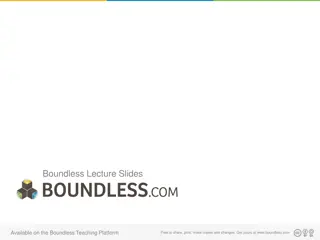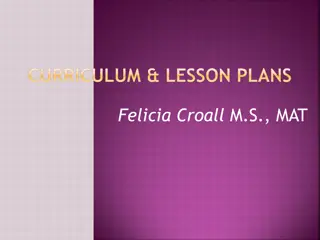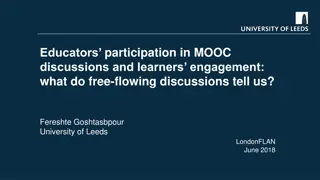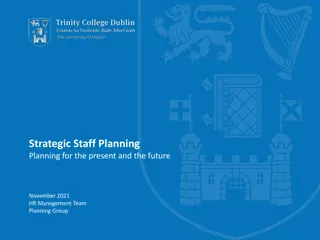Effective Lesson Planning for Educators
Understand the importance of planning a lesson effectively including setting goals, structuring lessons, and evaluating student learning. Gain insights into Bloom's Taxonomy, selecting content, and mastering lesson preparation. Discover the key steps like testing prior knowledge, arousing curiosity, and presenting subject matter to enhance teaching effectiveness.
Download Presentation

Please find below an Image/Link to download the presentation.
The content on the website is provided AS IS for your information and personal use only. It may not be sold, licensed, or shared on other websites without obtaining consent from the author.If you encounter any issues during the download, it is possible that the publisher has removed the file from their server.
You are allowed to download the files provided on this website for personal or commercial use, subject to the condition that they are used lawfully. All files are the property of their respective owners.
The content on the website is provided AS IS for your information and personal use only. It may not be sold, licensed, or shared on other websites without obtaining consent from the author.
E N D
Presentation Transcript
Dr. NAMBARU MARY SUNEETHA Assistant Professor MEASI College of Education No.2, Demellows Road, Choolai, Chennai-600112.
Understand the steps in planning a lesson and setting lesson goals Learning Experiences Evaluation of self and the students Specification of Behavioural outcomes Analyse the structure of the lesson Design a lesson plan Understand Bloom s Taxonomy of Educational Objectives Gain mastery in preparing a lesson plan Select the Content to be used
A teacher should concentrate on a wise planning of his teaching and instructional work carried along with his students during the whole session.
Knowledge about the needs, Interests and abilities of the students, The knowledge of psychology of learning, Principles of teaching, Previous knowledge of the students, and Effective mastery of the subject matter
Bossing defines, A lesson plan is an organized statement of general and specific goals together with the specific means by which these goals are to be attained by the learner under the guidance of the teacher on a given day.
Preparation or Introduction Presentation Comparison or Association Generalization Application and Recapitulation
Testing the previous knowledge of the students Arousing curiosity by the novelty of experimentation or activity Use of charts, pictures and models Skillful discussion This is most important step because well-begun is half done.
The teacher presents the subject matter to the students. Students get new ideas and knowledge. The students passively listen and learn the ideas told by the teacher. The teacher may demonstrate any experiment, use any teaching aid or do any activity/activities.
The new ideas or knowledge learnt should be compared and associated with already known ideas and facts. This step is most important when the teacher is establishing principles or generalizing definitions.
Students should draw out the conclusion themselves. Their generalizations may be incomplete or irrelevant. At this time the teacher should guide them to make corrections.
Any lesson will be incomplete if the past experience is not applied to new life situations. It is always the desire of the students to make use of generalizations and to verify whether they really work in new situations. Knowledge becomes clear and meaningful in this stage.
It is generally done by one of the following ways: Asking suitable questions on the topic taught / Applying a short objective type test / Asking the students to label the unlabeled sketch/diagram/picture
Regular, well organized and systematic work Prompts confidence and self-reliance Helps to proceed with particular aims in view Establishes proper connections between different lessons of study Therefore, they provide continuity in the teaching process
Stimulates the teacher to introduce striking questions and illustrations Provides greater freedom in teaching Helps the teacher to plan the teaching aids to be used in the class, well in advance and also ensure their workability Avoids wastage of time
A lesson plan should be written and well prepared assuming that teacher has gone through the matter from all aspects General Objectives also called non-behavioural objectives of the lesson should be clearly stated Specific objectives also called behavioural objectives should be clearly stated Types of teaching aids should be selected according to the situation Content, learning experiences, evaluation tools and procedure should be stated
1.Content Structure of a Lesson Plan 2.Specification of behavioural objectives 4. Evaluation 3. Learning Experience
Name of the School: X Standard: XI Name of the Guide Teacher: X Subject: Economics Date: X Topic: Course of Price Time: 45 Minutes Name of the Student: X
The student: Recalls problems of the price rise in India. Understands the relationship between prices and purchasing power of money. Compares the prices of different commodities from time to time and from place to place. Explains the effect of rising price on the growth and development of an Economy. contd .. and recognizes the economic
The student: Lists out the various types of indicators of price trend Examines the necessity of revising trend of prices Classifies various causes of price rise Illustrates the course of prices and various types of policy measures taken by the government contd .
The student: Understands the place given to the problem of rising prices in various plans Explains about the need for price stability. Analyses the situation of price rise and also various policy measures taken by the government. Develops skill in drawing inference about forthcoming price rise problem due to recent oil price rise.
Charts, graphs, Pictures showing price rise in India
International problem of rising price of crude oil (Details have been given in the following slide)
CONTENT SPECIFICATION OF BEHAVIOURAL OUTCOMES LEARNING EXPERIENCES (Teacher/Learner Activities) EVALUATION On August 2, 1990, Iraqi armed forces invaded Kuwait. This event gave rise international economic problem of rising price of oil. Due to this, the prices of other commodities also rise. The student recalls the previous knowledge of international economic problem state of Recalls and recognizes to an Contd...
CONTENT SPECIFICATION OF BEHAVIOURAL OUTCOMES LEARNING EXPERIENCES (Teacher/Learner Activities) EVALUATION 1. Iraqi occupation of Kuwait gave rise to which international economic problem? 2. What implication rising cost on the prices of the commodities? is the of transport
CONTENT SPECIFICATION OF BEHAVIOURAL OUTCOMES LEARNING EXPERIENCES (Teacher/Learner Activities) EVALUATION Course of prices: Price mechanism has a significant place in a planned economy. Changes in prices bring changes in the purchasing power of money also. Student understands relationship between and power of money. What do you mean by purchasing power of money? the Understands prices purchasing
CONTENT SPECIFICATION OF BEHAVIOURAL OUTCOMES LEARNING EXPERIENCES (Teacher/Learner Activities) EVALUATION Course of prices: Price has a significant place in a planned economy. Changes in prices changes purchasing of money also. mechanism Student explains effect of rising price on growth development of an economy. What happens to the purchasing power of money when the prices rise? the Explains the and bring the power in
CONTENT SPECIFICATION OF BEHAVIOURAL OUTCOMES LEARNING EXPERIENCES (Teacher/Learner Activities) Student compares the prices of different commodities from time to time and from place to place. EVALUATION At high prices money commands lesser commodities and at lower prices more commodities. Compares Rising of price of affected which sector economy directly? petrol of
SPECIFICATION OF BEHAVIOURAL OUTCOMES LEARNING EXPERIENCES (Teacher/Learner Activities) EVALUATION CONTENT Rising in oil prices economically hit international community. Student explains the effect rising price on the growth and development an economy. What is the effect of rising price on the growth development of an economy? Explains of and of
SPECIFICATION OF BEHAVIOURAL OUTCOMES LEARNING EXPERIENCES (Teacher/Learner Activities) Lists various types of indicators of price trends. Defines the word deflation. CONTENT EVALUATION out the Indicators of Price trends What do you mean by Inflation? Lists out
SPECIFICATION OF BEHAVIOURAL OUTCOMES LEARNING EXPERIENCES (Teacher/Learner Activities) The examines necessity of revising trend of prices in order to understand nature complexity problem. EVALUATION CONTENT student Trends of Prices in India The rising trend of prices in started at time? the India what Examines and the of
SPECIFICATI ON OF BEHAVIOURA L OUTCOMES CONTENT LEARNING EXPERIENCES (Teacher/Learner Activities) The classifies various causes of price rise. EVALUATION student What was the reason for price rise? Second world leads to the trend price rise war Classifies of
SPECIFICATION OF BEHAVIOURAL OUTCOMES CONTENT LEARNING EXPERIENCES (Teacher/Learner Activities) The student illustrates the course of prices and various types of policy measures taken by the government. EVALUATION When economic planning was adopted India? the Immediately after independence the Government formulated various economic policies Illustrates in
SPECIFICATION OF BEHAVIOURAL OUTCOMES CONTENT LEARNING EXPERIENCES (Teacher/Learner Activities) The understands place given to the problem of rising prices in various plans. EVALUATION student A rupee of 1969 is worth only 11 paise presently. Why? Economic planning in India began on optimistic note. Understands the an
SPECIFICA TION OF BEHAVIOU RAL OUTCOME S CONTENT LEARNING EXPERIENCES (Teacher/Learner Activities) The explains that every plan has eloquent about the need for stability. EVALUATION teacher Domestic supply situation favourable could easily meet the demand pressure What happened to the general price index? Explains was and been price rising
What is the effect of rising price on the growth and development of an economy? What do you mean by GDP? The rising trend of prices in India started at what time? What was the reason for price rise? When the economic planning was adopted in India? What happened to the general price index?
1.Trace in brief the trend of prices in India beginning with first five year plan. 2. Describe about the general price index. Name of the Guide Teacher Name of the Student Teacher
